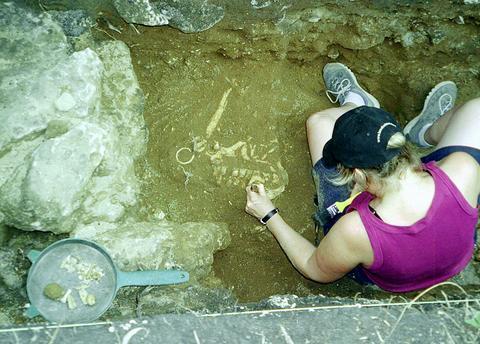Staring out from an ancient piece of pottery, the mysterious face of a bearded man has given scientists a unique glimpse of what the first settlers of Fiji may have looked like.
Researchers say the "extraordinary discovery" is a vital clue in mapping out how the South Pacific came to be inhabited some 3,000 years ago, suggesting the first direct link to islands some thousands of kilometers away.

PHOTO: AFP
Thought to be the work of the Lapita people -- a long-lost race which originated near modern-day Taiwan then migrated to Polynesia -- the fragment is also at least 200 years older than any other piece found in Fiji.
"This is the first time that a clearly recognizable face design made in three dimensions on a piece of Lapita pottery has been found in Fiji," said a statement from the University of the South Pacific, based in the archipelago.
Preliminary analysis shows that the eerie-looking face consists of a prominent raised nose, the left eye and what might be eyelashes, said Roselyn Kumar of the University of the South Pacific's Institute of Applied Sciences.
There are also designs that suggest what might be head-hair, and crescent shapes on the base which were possibly intended to represent beard-hair.
The find therefore gives researchers an opportunity to gaze on the countenance of Fiji's first inhabitants, from whom modern Polynesians are believed to be descended.
But equally significant is that it is the first time that a facial design has been found on Lapita pottery outside a group of islands north of Papua New Guinea -- which are some 3,400km away from Fiji.
"As such it represents an extraordinary discovery," the university said.
The find made it possible to conclude that the early people of Fiji had at some stage come from the far-off island chain, named the Bismarck Archipelago, Geography Professor Patrick Nunn said.
It could go some way towards settling the long archaeological debate on the settling of Polynesia -- a vast triangle of islands from Hawaii in the north, to New Zealand in the south-east and Rapanui or Easter Island in the east.
The new face fragment was found near Natadola Beach, west of the Fijian capital Suva, in the tourist area of Viti Levu island.
Around 60 pottery pieces were found during excavations and radiocarbon dating established the shard with the face design was 3,260 years old -- whereas Fiji's next oldest-known Lapita settlement goes back only 3,000 years.
It was possible that Natadola was the first place of human settlement in Fiji, Nunn said.
He added that the analysis suggested that the designs were made using the unique Lapita technique of pot decoration known as dentate stamping, whereby lines are made from a series of tiny regularly-spaced dots applied to the pottery before it was fired.
"It was a very time-consuming and precise technique used to create intricate designs, perhaps associated with ancestor worship," he said.
More than 100 Lapita sites have been located over an area from New Guinea to western Polynesia, a distance of over 4,000km.
US archaeologist Edward Gifford gave the race their name after mishearing the indigenous name of a site in New Caledonia where he was working in 1952.
He had found shards of distinctive pottery there and recognized a link to similar finds to the north in New Guinea.

Kehinde Sanni spends his days smoothing out dents and repainting scratched bumpers in a modest autobody shop in Lagos. He has never left Nigeria, yet he speaks glowingly of Burkina Faso military leader Ibrahim Traore. “Nigeria needs someone like Ibrahim Traore of Burkina Faso. He is doing well for his country,” Sanni said. His admiration is shaped by a steady stream of viral videos, memes and social media posts — many misleading or outright false — portraying Traore as a fearless reformer who defied Western powers and reclaimed his country’s dignity. The Burkinabe strongman swept into power following a coup in September 2022

TRUMP EFFECT: The win capped one of the most dramatic turnarounds in Canadian political history after the Conservatives had led the Liberals by more than 20 points Canadian Prime Minister Mark Carney yesterday pledged to win US President Donald Trump’s trade war after winning Canada’s election and leading his Liberal Party to another term in power. Following a campaign dominated by Trump’s tariffs and annexation threats, Carney promised to chart “a new path forward” in a world “fundamentally changed” by a US that is newly hostile to free trade. “We are over the shock of the American betrayal, but we should never forget the lessons,” said Carney, who led the central banks of Canada and the UK before entering politics earlier this year. “We will win this trade war and

‘FRAGMENTING’: British politics have for a long time been dominated by the Labor Party and the Tories, but polls suggest that Reform now poses a significant challenge Hard-right upstarts Reform UK snatched a parliamentary seat from British Prime Minister Keir Starmer’s Labor Party yesterday in local elections that dealt a blow to the UK’s two establishment parties. Reform, led by anti-immigrant firebrand Nigel Farage, won the by-election in Runcorn and Helsby in northwest England by just six votes, as it picked up gains in other localities, including one mayoralty. The group’s strong showing continues momentum it built up at last year’s general election and appears to confirm a trend that the UK is entering an era of multi-party politics. “For the movement, for the party it’s a very, very big

The Philippines yesterday slammed an “irresponsible” Chinese state media report claiming a disputed reef in the South China Sea was under Beijing’s control, saying the “status quo” was unchanged. Tiexian Reef (鐵線礁), also known as Sandy Cay Reef, lies near Thitu Island, or Pagasa, where the Philippines stations troops and maintains a coast guard monitoring base. Chinese state broadcaster CCTV on Saturday said that the China Coast Guard had “implemented maritime control” over Tiexian Reef in the middle of this month. The Philippines and China have been engaged in months of confrontations over the South China Sea, which Beijing claims nearly in its